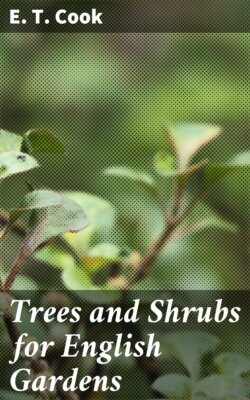Читать книгу Trees and Shrubs for English Gardens - E. T. Cook - Страница 12
На сайте Литреса книга снята с продажи.
TREES AND SHRUBS IN POOR SOILS
ОглавлениеTable of Contents
As there is vegetation to suit nearly all natural conditions, so those who find they have to undertake planting in poor, dry, hungry sands and gravels will find that there are plenty of trees and shrubs that can be used, though the choice is necessarily a more restricted one than they might make on better land. The very fact of the fewer number of available trees and shrubs may even be a benefit in disguise, as by obliging the planter to be more restricted in his choice the planting scheme will be all the more harmonious.
As to trees, Holly, Thorn, Juniper, Birch, Scotch Fir, and Mountain Ash are found wild on the poorest soils, and will even grow in almost pure sand. Oaks, though they never grow to the dimensions of the Oak of loamy woodlands, are abundant on poor soils, where they have a character of their own that is full of pictorial value. The lovely Amelanchier, daintiest of small trees, revels in sandy woods, as does also the Bird Cherry, another good native tree, while the Wild Cherry becomes a forest tree of large size and of loveliest bloom. Evergreen or Holm Oak and Arbutus are excellent in the south of England, enjoying the warmth and winter dryness of light soils.
Garden shrubs in general can be grown, though not so luxuriantly as on better soils, but some classes are especially successful on poor land such as Genista virgata. There are the Cistuses and Heaths, with Lavender and Rosemary, in the drier parts, and in the wetter places Kalmias, Andromedas, Rhododendrons, Ledums, Pernettyas, and Vacciniums, with the Candleberry Gale and the native Bog Myrtle, also Broom and Gorse, especially the Double Gorse. These, which are usually classed as peat shrubs, will succeed in any sandy soil with the addition of leaf-mould, and are among the most interesting and beautiful of our garden shrubs.
Those who garden on poor and dry soils should remember that though their ground has drawbacks it has also some compensations. Such soils do not dry in cracks and open fissures in hot weather, and do not present a surface of soapy slides in wet; they can be worked at all times of the year, except in hard frost; they are easy to hoe and keep clean of weeds and are pleasant and easy to work. They correct the tendency of strong soils to the making of a quantity of coarse rank growth, and they encourage the production of a quantity of flowers of good colour.
